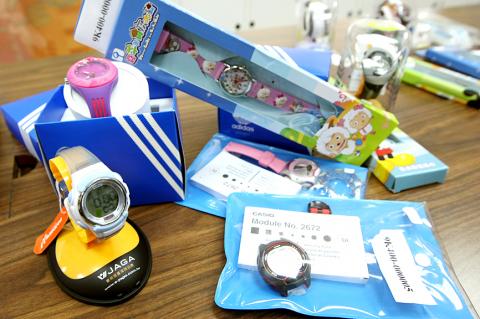About two out of every five children’s plastic watches sold in Taiwan contain an excessive amount of plasticizer that could pose a health risk, the Bureau of Standards, Metrology and Inspection’s (BSMI) latest investigation showed.
The bureau inspected 12 types of children’s watches sold at hypermarkets, toy stores and retail outlets across the country and found that five contained plasticizer at amounts exceeding the legal limits.
The bureau said product safety standards do not allow for plasticizer chemicals making up more than 0.1 percent of product mass, but the substandard plastic watches contained such chemicals in excess of this amount, with one Maxima brand watch containing 20.56 percent of plasticizers by mass.

Photo: CNA
The maker of the Maxima watch was also guilty of other product violations, including not having a proper product label indicating country of origin or the manufacturer’s name and address, and its product labels were not translated into Chinese.
A China-manufactured Casio watch also tested positive for plasticizer chemicals at 1.02 percent on its plastic watchstrap, despite costing NT$700.
BSMI deputy director-general Huang Lai-ho (黃來和) said watches that contain excessive amounts of plasticizers could be dangerous for children, who might put the plastic watchstraps in their mouth.
“Plasticizer chemicals could be absorbed through the skin when children wear the watch or enter the body if they put the watch in their mouths,” Huang said.
Plasticizers, or phthalate esters, contain environmental hormones that act as endocrine disruptors. The substances can potentially damage the liver and kidneys, cause men to develop female traits and increase the risk of breast cancer in women, the bureau said.
The bureau has ordered all substandard watches to be removed from store shelves and called for product improvements to be made, with fines of up to NT$200,000 for those who fail to comply.
It also urged parents to only buy watches that are properly labeled and teach children not to put plastic watches in their mouths.

The inspection equipment and data transmission system for new robotic dogs that Taipei is planning to use for sidewalk patrols were developed by a Taiwanese company, the city’s New Construction Office said today, dismissing concerns that the China-made robots could pose a security risk. The city is bringing in smart robotic dogs to help with sidewalk inspections, Taipei Deputy Mayor Lee Ssu-chuan (李四川) said on Facebook. Equipped with a panoramic surveillance system, the robots would be able to automatically flag problems and easily navigate narrow sidewalks, making inspections faster and more accurate, Lee said. By collecting more accurate data, they would help Taipei

STATS: Taiwan’s average life expectancy of 80.77 years was lower than that of Japan, Singapore and South Korea, but higher than in China, Malaysia and Indonesia Taiwan’s average life expectancy last year increased to 80.77 years, but was still not back to its pre-COVID-19 pandemic peak of 81.32 years in 2020, the Ministry of the Interior said yesterday. The average life expectancy last year increased the 0.54 years from 2023, the ministry said in a statement. For men and women, the average life expectancy last year was 77.42 years and 84.30 years respectively, up 0.48 years and 0.56 years from the previous year. Taiwan’s average life expectancy peaked at 81.32 years in 2020, as the nation was relatively unaffected by the pandemic that year. The metric

TAKING STOCK: The USMC is rebuilding a once-abandoned airfield in Palau to support large-scale ground operations as China’s missile range grows, Naval News reported The US Marine Corps (USMC) is considering new sites for stockpiling equipment in the West Pacific to harden military supply chains and enhance mobility across the Indo-Pacific region, US-based Naval News reported on Saturday. The proposed sites in Palau — one of Taiwan’s diplomatic allies — and Australia would enable a “rapid standup of stored equipment within a year” of the program’s approval, the report said, citing documents published by the USMC last month. In Palau, the service is rebuilding a formerly abandoned World War II-era airfield and establishing ancillary structures to support large-scale ground operations “as China’s missile range and magazine

Passengers on Taiwan High Speed Rail (THSR) will be required to use headphones and make phone calls in gangways under new “quiet travel” rules starting Sept. 22. THSR Chairman Shih Che (史哲) told media that THSR will run a three-month promotional campaign to ensure widespread adoption of the new rules. Those repeatedly ignoring the guidance face the potential termination of their transport contract, which can result in them getting escorted off the train, according to THSR. Shih shared his hope to cultivate an environment conducive to rest and reading for the train’s passengers, stating that these changes aim to “promote self-discipline” among passengers